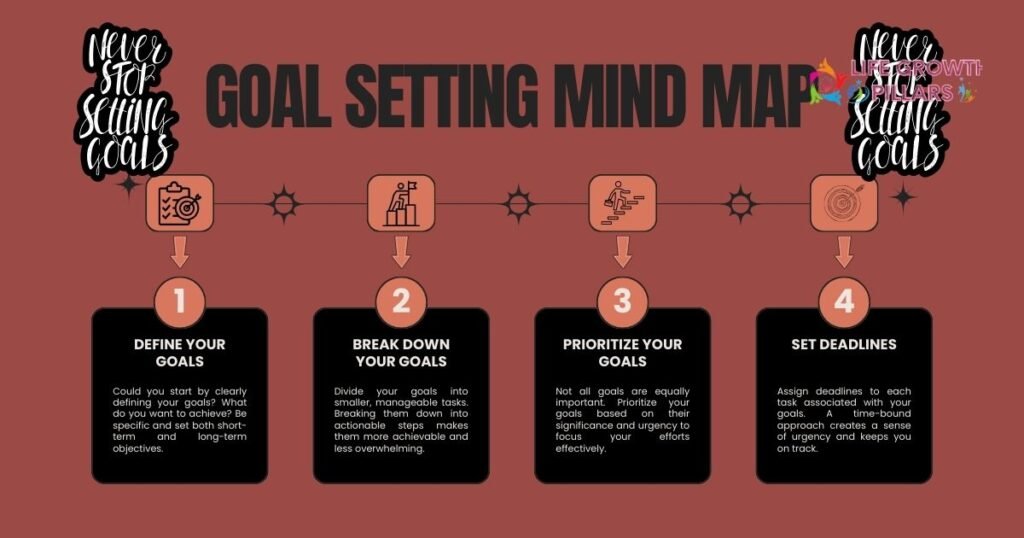The Art Of Goal Setting | How To Set And Achieve Your Goals

Tips For Goal Setting
Here are some tips for goal setting:
Start By Identifying Your Values And Priorities
- Reflect on your past experiences and think about the times when you felt the most content and fulfilled. What were you doing? Who were you with? What values were being honoured at that time?
- Think about the things that you are passionate about and the causes that you care deeply about. These can be excellent indicators of your values.
- Consider the people who are most important to you and the relationships that you value. What values are being honoured in those relationships? How can you prioritize those relationships in your life?
- Pay attention to the things that bring you joy and satisfaction. What activities, hobbies, or interests make you feel most alive and fulfilled? These can be excellent indicators of your values and priorities.
Set Specific And Measurable Goals
Create A plan
Find A Support System
Track Your Progress
Stay Positive
Make Your Goals Challenging But Achievable
- Consider breaking down larger goals into smaller, more manageable steps. This can make the overall goal feel less daunting and give you a sense of progress as you work towards it.
- It can be helpful to set specific, measurable goals rather than vague ones. For example, instead of setting a goal to “get in shape,” try setting a goal to run a 5k within a certain time frame.
- Don’t be afraid to adjust your goals if needed. If you find that a goal is truly unrealistic, it’s better to reassess and set a new goal than to continue feeling discouraged by something that isn’t achievable.
- Celebrate your successes along the way, even if they’re small. Recognizing progress can help keep you motivated and focused on achieving your ultimate goal setting.
Create A Plan
- Identify any potential obstacles or challenges that may arise and brainstorm solutions in advance.
- Consider the resources you will need to achieve your goals, such as time, money, or support from others.
- Prioritize your goals and focus on the ones that are most important to you.
- Establish a system for tracking your progress, such as a journal or checklist, to stay motivated and accountable.
- Be flexible and willing to adjust your plan as needed. Life can be unpredictable, and it’s important to be adaptable in the face of change for goal setting.

Break Your Goals Down Into Smaller, Actionable Steps
- Start by identifying your end goal and then work backwards to determine the specific actions needed to achieve it. This can help you create a roadmap or action plan that outlines each step along the way.
- When breaking down your goals, try to make each step as specific and measurable as possible. This will make it easier to track your progress and determine when you’ve achieved each milestone.
- Consider setting deadlines for each step in your action plan to help keep yourself accountable and on track.
- Don’t be afraid to adjust your plan as you go along. If you find that a particular step isn’t working or isn’t helping you achieve your goal, don’t be afraid to pivot and try something else.
Stay Motivated
- Break your goals into smaller, more manageable tasks. This will help you feel a sense of accomplishment along the way and keep you motivated to keep going.
- Visualize yourself achieving your goals. Imagine how you will feel once you’ve accomplished what you set out to do. This can be a powerful motivator.
- Don’t be too hard on yourself if you slip up or have a setback. Remember that achieving your goals is a journey and there will be ups and downs along the way.
- Seek out accountability partners who can help keep you on track. This could be a friend, family member, or even a coach or mentor.
- Celebrate your successes, no matter how small. Give yourself a pat on the back for each milestone you reach. This will help keep you motivated and focused on the end goal.
Seek Support
- Joining a support group or online community related to your goal. This can provide a sense of belonging and connection with others who are also working towards similar goals and helps in goal setting process.
- Hiring a coach or mentor who can provide guidance and accountability on a regular basis.
- Participating in a challenge or competition related to your goal. This can provide a sense of friendly competition and motivation to push yourself further.
- Seeking professional help from a therapist or counsellor if your goal involves mental health or emotional well-being.
Be Flexible And Adaptable
- It allows you to navigate uncertain or changing situations with ease, reducing stress and anxiety.
- It helps you to stay open-minded and receptive to new ideas and perspectives, which can lead to personal growth and development.
- It can improve your problem-solving skills, as you learn to think creatively and find alternative solutions when faced with unexpected challenges.
- It can make you more resilient and better equipped to handle setbacks or failures, as you learn to bounce back and recover quickly.
Celebrate Your Achievements
- Treat yourself to something special, like a nice dinner or a massage.
- Share your success with loved ones and allow them to share in your joy.
- Reflect on your journey and the obstacles you overcame to reach your goal.
- Take time to rest and recharge before embarking on new goals.
Review And Adjust Your Goals
- Schedule regular check-ins with yourself to evaluate your progress towards your goal setting. This can be daily, weekly, or monthly depending on the timeframe of your goals.
- Be honest with yourself about why you may need to adjust your goals. Is it because your priorities have changed? Or have you realized that your initial goals were too ambitious?
- Don’t be afraid to ask for feedback from others. Sometimes an outside perspective can help you see things more clearly and make more informed decisions for goal setting.
- When adjusting your goals, make sure they are still challenging but also realistic. Setting unattainable goals can lead to disappointment and discouragement.
Keep Going
- Reflect on your progress towards your goals and assess whether you are on track or if changes need to be made.
- Consider any obstacles or challenges that you have encountered and how you can overcome them.
- Take into account any new opportunities or changes in your personal or professional life that may impact your goals.
- Be specific and realistic when adjusting your goals. Set new targets that are achievable and align with your overall vision.
- Communicate any changes in your goals to relevant stakeholders such as your team, manager, or mentor.

Conclusion
Frequently Asked Questions
Q1. What is the significance of goal setting in personal development?
A. Goal setting plays a pivotal role in personal development as it provides a clear roadmap for individuals to identify their aspirations and work towards achieving them. Setting goals helps in fostering focus, motivation, and a sense of direction in life.
Q2. How can I effectively set achievable goals?
A. To set achievable goals, it’s crucial to follow the SMART criteria – Specific, Measurable, Achievable, Relevant, and Time-bound. Break down larger goals into smaller, actionable steps and create a timeline to track progress effectively.
Q3. Is it beneficial to share my goals with others?
A. Sharing your goals with others can be beneficial as it adds a layer of accountability and support. When you vocalize your goal setting, you’re more likely to stay committed and receive encouragement from peers or mentors.
Q4. What are common pitfalls to avoid when setting goals?
A. One common mistake is setting vague or unrealistic goals. Avoid overcommitting or underestimating the effort required. Additionally, failing to reassess and adjust goals based on changing circumstances can hinder progress.
Q5. How can setbacks be managed while pursuing goals?
A Setbacks are a natural part of any journey. To manage them effectively, maintain a positive mindset, learn from setbacks, and adapt your approach accordingly. Use setbacks as learning opportunities to refine your strategies.
Final Thoughts
Mastering the art of goal setting is a transformative skill that empowers individuals to navigate their lives with purpose and direction. By setting clear, achievable goals and employing perseverance, adaptability, and dedication, one can unlock their full potential and achieve remarkable success in various facets of life. Remember, goal setting is not merely about reaching a destination; it’s about embracing the journey, learning from experiences, and continuously evolving towards a better version of oneself.



